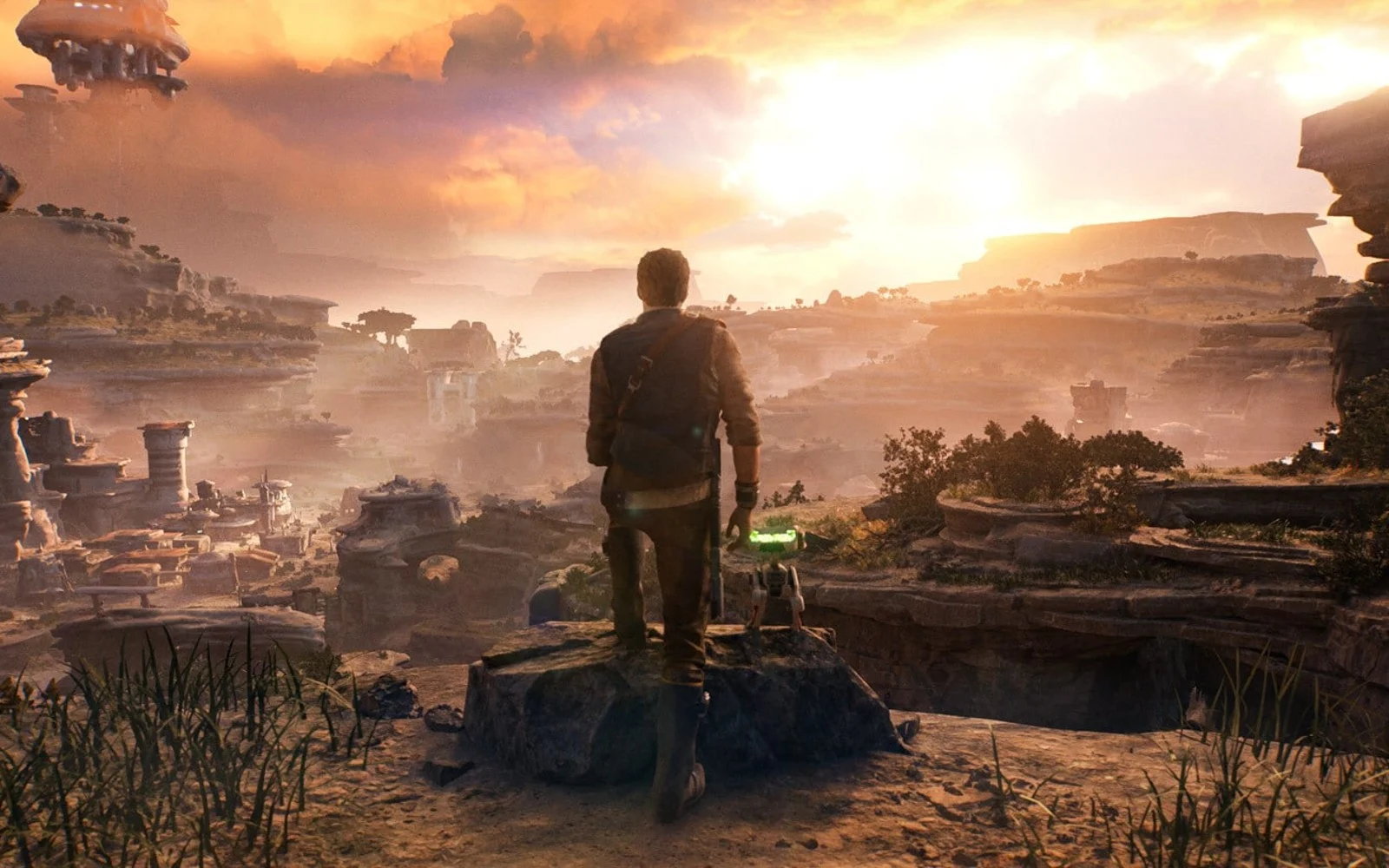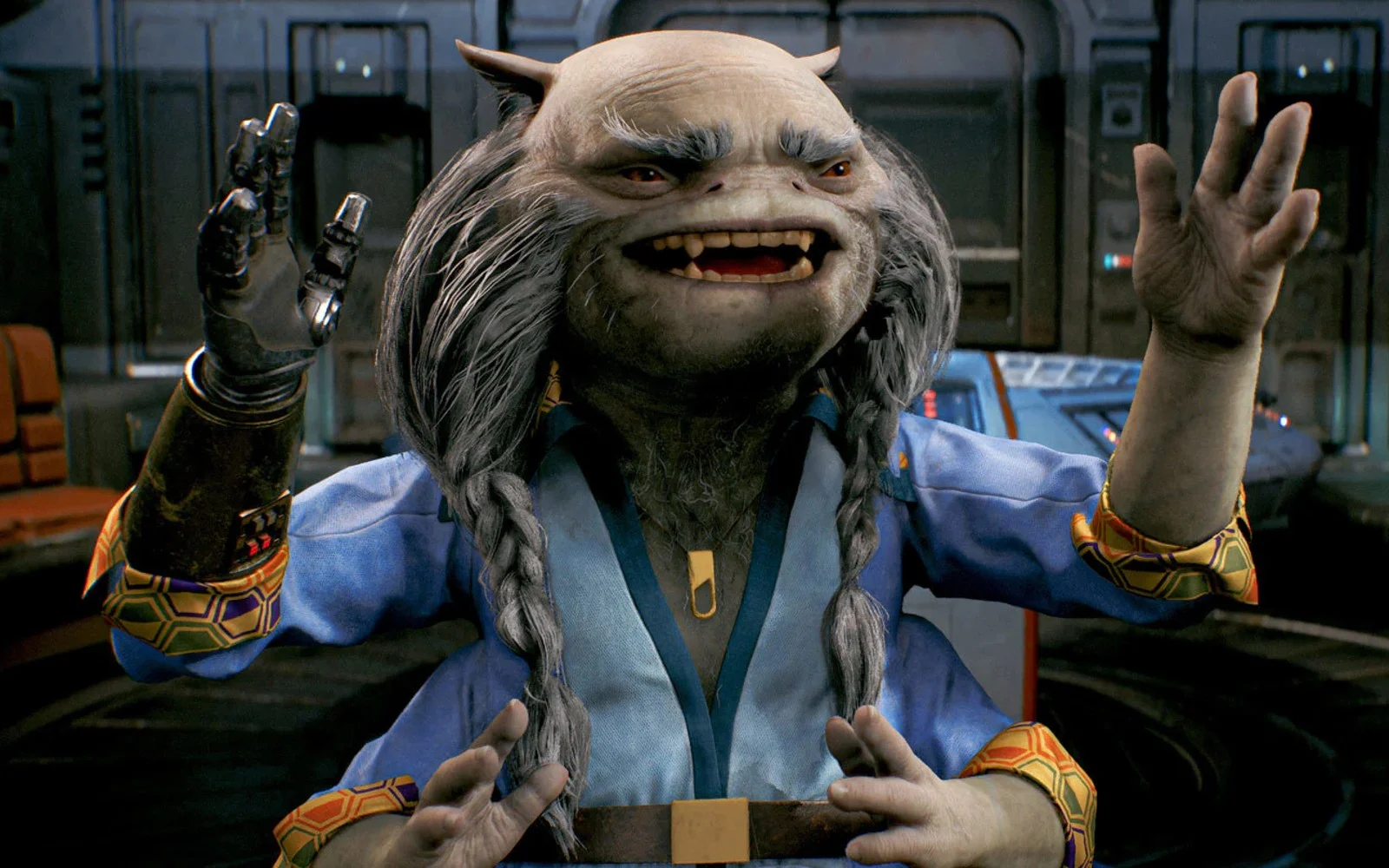About an hour into my time with Star Wars Jedi: Survivor, Cal Kestis, the game’s protagonist, reunites with Greez Dritus, the cranky pilot from Star Wars Jedi: Fallen Order. The two embrace after five years apart, one of Greez’s four arms now replaced by a robotic prosthetic. It’s a moment that encapsulates how I felt playing the upcoming game at a recent preview event Electronic Arts and Respawn Entertainment held in Los Angeles. Playing Jedi: Survivor feels like reuniting with a friend you haven’t seen in a few years.
Right from the start, Jedi: Survivor feels like a more refined Jedi: Fallen Order. The preview began on Koboh, one of the first planets players will visit when they get their hands on the game later this month. Exploring Koboh is immediately compelling since Cal has all the abilities he rediscovered by the end of Jedi: Fallen Order, plus a new grappling hook for quickly traversing across some gaps. Cal also feels more satisfying to control, as there’s more weight and precision to his movements. When he jumps, he doesn’t float the way he did in Jedi: Fallen Order. In combat, Cal feels more deadly and proficient with his lightsaber.
“Cal has a bit of swagger now, and that was intentional. We wanted the player to feel that,” Game Director Stig Asmussen tells me during a break from the preview. “Keep in mind [Jedi: Fallen Order] was the first time for us,” he says. Before Jedi: Fallen Order, those who worked at the studio were best known for creating first-person shooters like Titanfall and Call of Duty. “We were learning while we were making that game – we’re still learning – but as we were building it, we got better at building it.”

Respawn Entertainment / EA
Asmussen and his team have also hit a comfortable stride in executing the specific demands of the series they’re building. Take Koboh, for instance. I can safely say it is larger and more intricate than Zeffo, Jedi: Fallen Order’s most fully realized planet. Asmussen recommended those of us at the event stick to the game’s critical path to see as much as the preview had to offer, but I couldn’t help but get sidetracked by all the optional content I found on Koboh. One of my favorite discoveries involved an ancient ruin with a particularly devious puzzle inside that had me stumped for a few minutes. Another highlight involved investigating an abandoned mine that it turned out was home to a deadly rancor.
Koboh also does something surprising for the series. Early in his first visit to the planet, Cal comes across a small settlement of people trying to eke out an existence away from both the Empire and a local gang of raiders. The game offers a few options here. Cal can talk with the townsfolk, take on a side quest to explore the aforementioned mine and trade with a merchant who will give you cosmetics in exchange for crystals you can find throughout the game. Cal can also visit a canteen full of colorful characters, including a smooth-talking droid bartender named MXNK-6. The inclusion of a hub world might not be mechanically groundbreaking, but it goes a long way to making Koboh feel less like a level in a video game and more like a place that could actually exist in a galaxy far, far away.
“We’ve gotten better as storytellers,” Asmussen says. “There were very important decisions we had to nail down while making the first game – like how high could Cal jump – before we could have conversations about how to decorate this corner to make it feel like an authentic, lived-in space.”
I didn’t progress far enough in the game to unlock some of Cal’s more exciting new tools, including the crossguard lightsaber and blaster pistol, but at the end of the preview, I did get to see a Respawn developer put those weapons to use. In combination with his Force powers, Cal’s new armaments allow for more creative ways to approach combat. At one point in the showcase, the dev lifted all of the scout troopers in front of him, and then proceeded to shoot them all out of the air with a series of rapid blaster bolts. It wasn’t a very Jedi way of dispatching Cal’s enemies, but I would be lying if I told you it didn’t look cool.
One other thing the dev did was use Cal’s entire move set, including all five of his available combat stances, without resting at a meditation circle to switch between them. In the preview, I could only map two of Cal’s available stances to the d-pad. The combat showcase was the last thing Respawn showed during the preview, so I didn’t get a chance to ask questions about what I saw. But if I had to take a guess, you can eventually freely switch between all of Cal’s combat styles.

Respawn Entertainment / EA
If that sounds intimidating, you’re free to play Jedi: Survivor like an RPG. Cal’s progression occurs across multiple skill trees, with each one dedicated to a different aspect of his kit. Additionally, there’s a new perk system that allows you to further augment Cal’s combat abilities. Asmussen said it’s possible to earn enough skill points to unlock all of Cal’s skills, but you can also choose to specialize in the combat abilities that fit your playstyle. On that note, there are also more options for customizing Cal’s appearance. The clothing system is more robust, allowing you to change individual parts of Cal’s outfit. You can also give him different haircuts and beards.
At the end of the preview, I left even more excited to play Star Wars Jedi: Survivor than when I first arrived at the event. I will say it does feel like a safe sequel. I didn’t get to see some of the game’s more interesting new mechanics, including Cal’s newfound ability to tame mounts and fight with NPC companions, but I doubt those additions will transform the series into something it wasn’t before. If Jedi: Fallen Order didn’t do it for you, Jedi: Survivor is unlikely to change your mind. For everyone else, I think what you can expect is a bigger and better realization of Respawn’s original vision. Star Wars Jedi: Survivor arrives on PlayStation 5, Xbox Series X/S and PC on April 28th.
Credit: Source link


Comments are closed.